Volvo Ocean Race: Mind Games
Published on May 13th, 2015
By Ed Gorman
The Volvo Ocean Race is a long business, going on in the background of our lives for eight months. During that time the sailors involved, especially the skippers, are ever-more-deeply immersed in the battle of wills that the Volvo inevitably becomes.
At one level it is a yacht race, a war of boatspeed, race tactics and weather strategy in identical boats. At another it is a game of pressure, of mental toughness and trying to impose a psychological as well as a performance superiority on your rivals.
Charles Caudrelier, the skipper of the Dongfeng Race Team, has been thinking a lot about this as he enjoys a few days well-earned rest after winning the sixth leg from Itajai in Brazil to Newport in the Unites States. After 17-and-a-half days at sea and 5,811 nautical miles of ocean racing, he and his Chinese-sponsored crew crossed the finish line just three minutes and 25 seconds ahead of Ian Walker’s team on Abu Dhabi Ocean Racing (ADOR). (We have almost got to the point of taking these hitherto absurdly close finishes for granted).
This was Dongfeng’s second stage win, something that only Walker’s pre-race favorites have managed. It leaves Caudrelier’s crew still in second place, an almost insurmountable seven points adrift of ADOR courtesy of Dongfeng’s dismasting just west of Cape Horn in leg five which added eight points to their tally.
Caudrelier knows he has a mountain to climb if he is going to beat ADOR come the finish of the race at Gothenburg. Like a football manager in the final stages of a league season, he needs “other results to go his way”, specifically for ADOR to have a difficult leg of their own, for him to finish on top. In some sense the matter is thus out of his hands.
But the Frenchman also believes that the Dongfeng team has established a critical superiority in the minds of most of his opponents, even Walker at times. Caudrelier gave this fascinating insight into his own view of the battle with the British two-time Olympic silver medalist as the two rampaged through the Southern Ocean towards Cape Horn and Dongfeng’s dismasting.
“Things have changed and we can feel that everybody considers us a dangerous team,” he said. “Before we broke the mast I could feel that ADOR was completely under pressure. I could feel that, in a way, we were taking the lead in their minds, you know. I can sense that Ian Walker has a lot less pressure on his shoulders now than before, but I could see then that he was wondering whether he could win this race.”
Dongfeng’s consistency tactically and the team’s excellent boatspeed has worn away at the confidence of their rivals, Caudrelier believes. (He does not say this with any swagger, it’s more matter of fact). “Before, people always had a job to beat us; now they feel they don’t believe they can do it, so it is good. I think they can beat us but, in their minds, we are a strong team and they are afraid of us,” he said.
In any one-design fleet, one or two boats will always go faster on different points of sail, at different angles or in different sea states. This is sometimes to do with minute discrepancies in hull form but more often a result of different modes of sailing employed by the crew. Caudrelier has raced in a number of one-design fleets and won in them and he has often come across muttering about his boat being quicker.
This Volvo is no exception and it only underlines his earlier point about achieving a psychological advantage over his opponents. “They always think that we have a faster boat, always faster than the others,” he said. “You know, when people start to say that your boat is not one-design, in a one-design world, it is, for me, a sign that you are becoming the strongest team in their minds. It’s always the same story in one–design.”
As the race has evolved it has turned into a battle of wills between Caudrelier and Walker. The French skipper has much praise for his British counterpart, though he believes Walker is far better off in a one-design fleet than in a more open rule. “He is a very hard worker. He is a very smart guy and I think, looking at his team, he is a good leader. I think he is a good skipper, but he is not comfortable with the design side,” he said.
The six-point gap* against Walker’s team is a big margin to overcome but Caudrelier is not giving up. “If they don’t have any trouble or a really bad leg, it’s going to become complicated for sure,” said Caudrelier. “They are a strong team. But, you know, anything can happen. Remember the last Volvo, Telefonica was fighting for first place and ended up finishing fourth, so anything can still happen.
“We broke our mast for no apparent reason, so that could happen to someone or they could just damage their sails, without the fractional sail or a spinnaker, for example, your race is compromised. So we are going to fight to the finish to keep the opportunity to win. But if they don’t make any mistakes or have any problems, it is going to be hard for sure,” he said.
While Walker and his crew have been on their minds and often in sight for long periods of every leg, Caudrelier and his team are also keeping a keen eye on Bouwe Bekking and Team Brunel, who are third overall, four points adrift of Dongfeng. The likeable Dutchman did not set off on his seventh Volvo Ocean Race to make up the numbers and he will be disappointed with a series of poor finishes in legs three, four and five.
But Team Brunel was back on the podium in Newport, where they finished third, and Caudrelier knows he will have to fight hard to keep them behind him. “We have had many battles with him already and there are more to come, for sure,” he said of Bekking.
The next stage, leg seven from Newport to Lisbon, a mere 2,800 nautical miles, is one of the few heavy weather passages left in the modern Volvo and, as such, Caudrelier believes it will suit ADOR. He reckons it could be one of the toughest stages of the race when not breaking the boat and making the right sail choices will be critical to success. Gear-changing in such a tight fleet will be the time when gains and losses will be made.
“It will again be a race of boatspeed and managing the boat and the change-over of the sails well,” he said, “because each time you make a change, you can lose so much if you make a mistake in your crossover. This is, for sure a good leg for ADOR, they are quite strong in heavy conditions, and it’s a tough leg for us because we sail with the Chinese who have less experience in these conditions. So it is a dangerous one for us, like leg five.”
Down below on the VO65 Dongfeng, written on one of the bulkheads, are the words “DON’T GIVE UP”, it is the team’s mantra and they plan to stick to it. Come the end of this ocean marathon in June, if Dongfeng finish on the podium it will be a result way beyond the team’s expectations when they set out on their mission back in October 2013 when Dongfeng Race Team came to fruition with the mission of putting the Chinese sailors at the core of the project. However, this plays out over the remaining three legs, Caudrelier and his team will fight for every mile to ensure they have a podium place in Gothenburg.
There is officially a 6-point gap between Dongfeng Race Team and Abu Dhabi Ocean Racing. However, in reality Dongfeng would need 7 points to overcome this gap as Ian Walker and his team are ahead on in-port race points that come into play in the event of a tie.


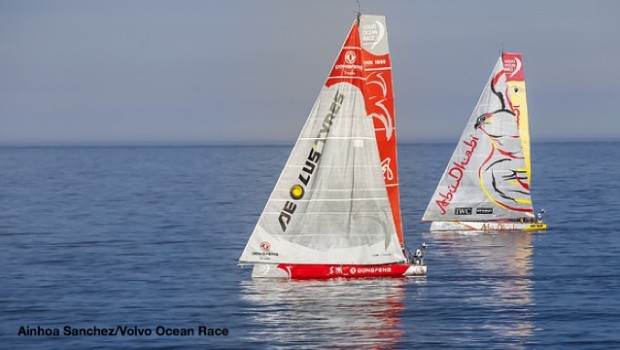


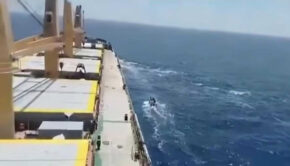
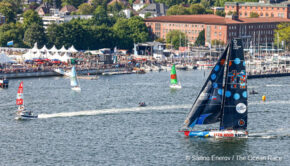
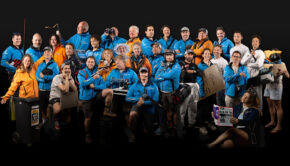
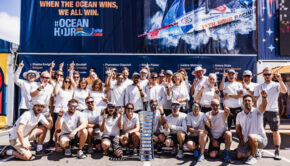
 We’ll keep your information safe.
We’ll keep your information safe.